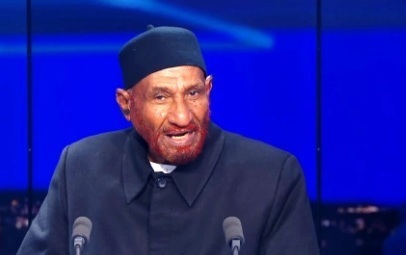Sudan opposition alliance considers ways to separate political and military actions
August 21, 2018 (KHARTOUM) – Opposition leader Sadiq al-Mahdi announced the formation of a committee to mull over an unambiguous separation of political and military tracks in the opposition Sudan Call alliance which gather political and armed groups.

In a written oration released from London on the occasion of Eid al-Adha holiday on Tuesday, al-Mahdi who is also the chief of Alansar religious community spoke about an undisclosed decision by the members of the Sudan Call Leadership Council in a recent meeting held last week in Paris between 17-19 August.
He said he told his allies from the armed groups that the current structure of the Sudan Call overlaps between the civil and military tracks, adding he suggested to adjust it in a way to completely separate between the peaceful civil track of the Sudan Call and the military track of the Sudan Revolutionary Front (SRF).
“At the meeting of the leader of Sudan Call factions, it was agreed to form a committee to propose the necessary structure for the clear separation between the peaceful civil track and the military track of the Sudan Revolutionary Front alone,” he said.
Also, he added that the armed groups in Darfur and the Two Areas have committed themselves to a unilateral truce they renew regularly since the Paris Declaration sealing the alliance between his National Umma Party and the SRF groups in August 2014.
Al-Mahdi has used to explain that he persuaded the armed groups to join him in the quest of a holistic negotiated settlement for the Sudanese crisis and that the government has to value his efforts to bring peace and engages in a serious process for peace and democratic reforms.
Nonetheless, he remains criticized by his allied rebel groups for calling to reconsider the arrest warrants by the International Criminal Court (ICC) against President al-Bashir. Last July there was a large campaign by activists from western Sudan after recent statements renewing his call to reconsider Bashir’s indictment.
To explain his position, al-Mahdi Tuesday recalled his principled position against the impunity for war crimes and crimes against humanity.
The leader of the Sudan Call Leadership Council has called since several years for a hybrid court from African, Arab and Sudanese judges to try President al-Bashir.
In his long speech, al-Mahdi said before to refer the Darfur case to the ICC, the Security Council had to give a chance for reconciliation and pointed to the example of South Africa and the peace agreement in Sudan between the government and the SPLM in 2005.
The Security Council cannot decide on the referral of Darfur crimes without the consent of the victims, he said.
“Before that, victims of abuse may accept to bypass criminal accountability in exchange for an interest they see as it happened before,” stressed the exiled opposition leader.
Al-Mahdi is the leader of the largest opposition party in the east African country. He was Sudan’s prime minister from 1986 until the coup d’état of 30 June 1989 that brought al-Bashir to power.
(ST)

